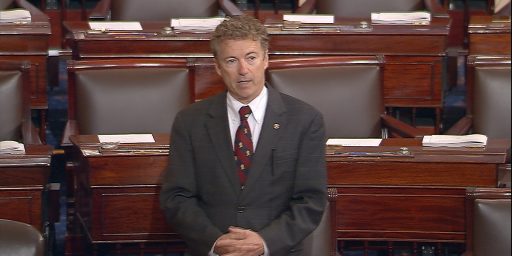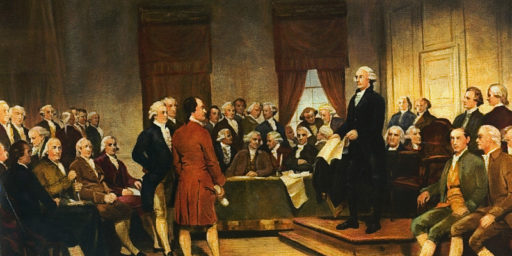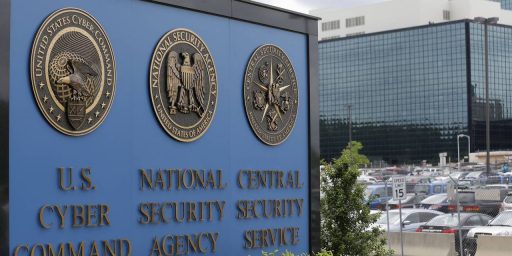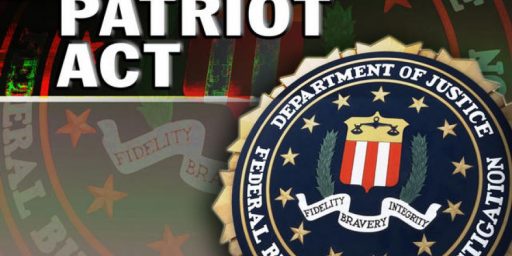NY Times Endangers American Security
Senator Accuses Times of Endangering U.S. (AP)
A Republican senator on Saturday accused The New York Times of endangering American security to sell a book by waiting until the day of the terror-fighting Patriot Act reauthorization to report that the government has eavesdropped on people without court-approved warrants.
“At least two senators that I heard with my own ears cited this as a reason why they decided to vote to not allow a bipartisan majority to reauthorize the Patriot Act,” said Republican Sen. John Cornyn of Texas. “Well, as it turns out the author of this article turned in a book three months ago and the paper, The New York Times, failed to reveal that the urgent story was tied to a book release and its sale by its author.”
Cornyn did not name the senators in his remarks on the Senate floor.
Cornyn misses his own point here: yes, The New York Times knowingly compromised national security in an effort to sell papers and promote James Risen’s forthcoming book. But isn’t the bigger concern that there are at least two members of the United States Senate who vote based on what they read in a discredited and obviously agenda-driven newspaper?






It seems like there are two kinds of people in this country: Republicans and Americans. When did this republican hostility to American begin? Why do they hate this country so much?
Forgive me if I’m repeating a talking point, but …
… how does the Times story endanger national security?
It was public knowledge (in the U.S. Code ferchrissakes) that the feds could get FISA warrants & spy on people.
Any terrorist with a 3-digit IQ would assume that the feds were trying to spy on him.
So what did the Times story change? It just points out that the feds were choosing to do their spying illegally.
(Leaving aside the classified nature of the leaks. The Plame case gave us plenty of conservatives distinguishing between “classified” and “endangers national security.”)
Readers: I would like to thank both Ken and Anderson for falling into an obvious trap. Please compare their comments on this post — which alledges leaking of information vital to national security by the NY Times — with their comments in my previous posts on Valerie Plame (scroll down). If there has ever been a more blatant example of partisanship, I can’t find it.
No Leopold, it is the revealing of criminal conduct by the administration that is vital to national security here. You put loyalty to Bush and the republican party above loyalty to America. You and your kind are the danger to our national security.
Leopold:
You have made the correct observation about Ken and Anderson. My congratulations to you.
I am sure you also know that both of these guys have but one agenda. That is “Hate Bush”, and they are constantly spewing that hate here at every opportunity.
Thanks for you keen eye in your observation and comment.
“Gotcha” is fun, Leopold, but you have to read first.
I said “leaving aside the classified nature of the leaks.” That is, it’s open to the feds to prosecute whoever leaked. More power to ’em.
My question was only “was national security jeopardized”? Specifically, w/r/t Bush’s sounding even stupider than usual by making that claim.
No one, that I’ve seen, has had any info that Plame’s cover being blown has directly affected national security. A matter of luck, it seems, given the callous indifference of her exposers. Hasn’t stopped many on the right from harping on that point. Not for “partisan advantage” of course–only the Left is partisan.
The problem re: Plame has always been that she was blown by White House staff pursuing a vendetta. (Follow the link, it’s amazing stuff: Libby versus Bush.)
In the wiretaps story, we have illegal conduct being exposed, probably by illegal methods. This certainly creates serious legal & ethical dilemmas which I do not deprecate.
Still, if the White House can (1) break the law and then (2) classify its having done so, that is just a little too Catch-22 for me … and I suspect for most Americans.
Anderson,
It’s not clear that a law was broken. People keep referring to the statute and ignoring the case law. There was a case in 1972 (can’t remember the name) that upheld this kind of presidential power with respect to the 4th amendment. The later statute does nothing to change this. So, from Bush’s perspective the wiretaps are legally ambiguous at worst and legal at best.
As for my own feelings about the propriety, I’m a bit uncomfortable with the President having so much power, particularly when there are courts that can issue these warrants in short order.
Say what you want about the NYtimes. Say what you want about journalism, reporters, etc.
But they’re private industry. Even if they did ‘hold’ that story for book-release-timing, that’s their right.
It’s all the other reporters’ fault that they didn’t get the story while NYT was sitting on it.
The people that WE need to hold accountable are the elected officials–because these people are actually supposed to represent us.
He’s a two-term president. He’s not afraid of voter scrutiny (or its perception).
While the NYT has the right under the 1st admendment to publish a classified story that has the potential to directly effect our securty and freedom that we as Americans is guaranteed under the Constitution and the Bill of Rights, The NYT has no right to use their freedom to directly or indirectly effect my sexurty and freedom that I have under those same documents.
In the event that we are again hit with an attack by terrorists as a direct result of their story, and Americans are killed as a result, Is the NYT ready to accept the responsibility for causing the attack by failed or unknown intelligence that would have been obtained if the story had not been published.
I seriously doubt they will, instead, they will take their money from the book and run.
Robert Prather: It’s not clear that a law was broken. People keep referring to the statute and ignoring the case law. There was a case in 1972 (can’t remember the name) that upheld this kind of presidential power with respect to the 4th amendment. The later statute does nothing to change this. So, from Bush’s perspective the wiretaps are legally ambiguous at worst and legal at best.
Well, if you think of that case, it would be useful. That might address some of the constitutional issues, but being constitutional & being legal are two different things. (There is no constitutional bar to driving 100 mph on the interstate, but Congress won’t let you.)
So I don’t see how mere constitutionality, as it were, gets Bush off the hook. And the only reading of the statute I’ve seen that exonerates Bush is one that selectively omits the parts he’s allegedly violated.
Bottom line: if there was a genuine need for the ops that’ve been performed, Bush could’ve easily found a way to do them legally. Which leads to a strong presumption that there was no such need … counterbalanced only by the arrogance of this administration, which could easily lead them to prefer violating the law rather than asking a court’s or Congress’s permission.
Anderson,
Timing could well have been an issue. If it requires days to get a warrant that might not do if they’re using disposable cell phones. I’ve since found out that they can go ahead with the taps and have 72 hours to apply for the warrants, which would support your case for arrogance, though I also read that even doing it in advance creates major difficulties. If I knew the full nature of those difficulties I could answer better. There’s a legal analysis of it here.
If the power comes from the President’s article 2 powers, no statute would diminish it. Either way, there will be investigations and the propriety of them will be sussed out. It doesn’t bode well for the critics that Bush owned up to it almost immediately — it suggests he thinks he’s on sound legal footing. Of course, you would probably just assume this is more arrogance on his part.